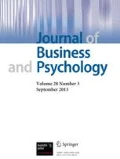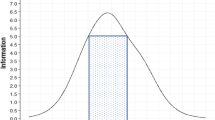Abstract
This study investigates the relationships among job search self-efficacy beliefs, number of job interviews participated in, and job search outcomes using data collected from graduating college job seekers at multiple points in their respective job searches. Results indicate that job search self-efficacy is positively related to number of total offers and number of offers from a preferred employer. Consistent with our hypothesis, job search self-efficacy beliefs moderate the relationship between number of interviews and number of offers, indicating that highly confident job seekers were more efficient in converting interviews into job offers.
Similar content being viewed by others
REFERENCES
Anderson, S.L., & Betz, N.E., (2001). Sources of self-efficacy expectations: Their measurement and relation to career development. Journal of Vocational Behavior, 58, 98-117.
Bandura, A. (1986). Social foundations of thought and action: A social cognitive theory. Englewood Cliffs, NJ: Prentice-Hall.
Bandura, A. (1997). Self efficacy: The exercise of control. New York: Freeman.
Barber, A.E. (1998). Recruiting employees: Individual and organizational perspectives. Thousand Oaks: Sage Publications.
Barber, A.E., Daly, C.L., Giannantonio, C.M., & Phillips, J.M. (1994). Job search activities: An examination of changes over time. Personnel Psychology, 47, 739-766.
Blau, G. (1994). Further exploring the relationship between job search and voluntary individual turnover, Personnel Psychology, 46, 313-330.
Blau, G. (1994). Testing a two-dimensional model of job search behavior. Organizational Behavior and Human Decision Processes, 59, 288-312.
Brasher, E.E., & Chen, P.Y. (1999). Evaluation of success criteria in job search: A process perspective. Journal of Occupational & Organizational Psychology, 72, 57-70.
Breaugh, J.A. (1992). Recruitment: Science and practice. Boston: PWS-Kent Publishing.
Bretz, R.D., Rynes, S.L., & Gerhart, B. (1993). Recruiter perceptions of applicant fit: Implications for individual career preparation and job search behavior. Journal of Vocational Behavior, 43, 310-327.
Cable, D.M., & Gilovich, T. (1998). Looked over or overlooked? Prescreening decisions and pos interview evaluations. Journal of Applied Psychology, 83, 501-508.
Caldwell, D.F, & Burger, J.M. (1998). Personality characteristics of job applicants and success in screening interviews. Personnel Psychology, 51, 119-136.
Caplan, R.D., Vinokur, A.D., Price, R.H., & van Ryn, M. (1989). Job seeking, reemployment, and mental health: A randomized field experiment in coping with job loss. Journal of Applied Psychology, 74, 759-769.
Davey, J.A., Anderson, J.S., & DiMarco, N. (1995). Outcome comparisons of formal out-placement services and informal support. Human Resource Development Quarterly, 6, 275-288.
Eden, D., & Aviram, A. (1993). Self-efficacy training to speed reemployment: Helping people to help themselves. Journal of Applied Psychology, 78, 353-360.
Ellis, R.A., & Taylor, M.S. (1983). Role of self-esteem within the job search process. Journal of Applied Psychology, 78, 352-360.
Gist, M.E. (1987). Self-Efficacy: Implications for organizational behavior and human resource management. Academy of Management Review, 12, 472-485.
Gist, M.E. & Mitchell, T.R. (1992). Self-Efficacy: A theoretical analysis of its determinants and malleability. Academy of Management Review, 17, 183-211.
Kanfer, R., & Hulin,.L. (1985). Individual differences in successful job searches following lay-off. Personnel Psychology, 38, 835-847.
Lent, R.W., & Hackett, G. (1987). Career self-efficacy: Empirical status and future directions. Journal of Vocational Behavior, 30, 347-383.
Nesdale, D., & Pinter, K. (2000). Self-efficacy and the job-seeking activities in unemployed ethnic youth. The Journal of Social Psychology, 140(5), 608-614.
Osborn, D.P. (1990). A reexamination of the organizational choice process. Journal of Vocational Behavior, 36, 45-60.
Plumly, L.W., & Oliver, J.E. (1987). The locus of control attribute and the job search process. Psychological Reports, 61, 907-910.
Regenold, Sherman, & Fenzel (1999). Get back to work: Self efficacy as a predictor of employment outcome. Psychiatric Rehabilitation Journal, 22(4), 361-367.
Rynes, S.L., Bretz, R.D., Jr., & Gerhart, B. (1991). The importance of recruitment in job choice: A different way of looking. Personnel Psychology, 44, 487-521.
Rynes, S.L., & Gerhart, B. (1990). Interviewer assessments of applicant “fit”: An exploratory investigation. Personnel Psychology, 43, 13-35.
Saks, A.M., & Ashforth, B.E. (1999). Effects of individual differences and job search behaviors on the employment status of recent university graduates. Journal of Vocational Behavior, 54, 335-349.
Saks, A.M., & Ashforth, B.E. (2000). Change in job search behaviors and employment outcomes. Journal of Vocational Behavior, 56, 277-287.
Schmit, M.J., Amel, E.L., & Ryan, A.M. (1993). Self-reported assertive job seeking behaviors of minimally educated job hunters. Personnel Psychology, 46, 105-124.
Schwab, D.P., Rynes, S.L., & Aldag, R.A. (1987). Theories and research on job search and choice. In K. Rowland and G. Ferris (Eds.), Research in Personnel and Human Resource Management (Vol. 5, pp. 129-166). Greenwich, CT: JAI Press.
Sherer, M., Maddux, J.E., Mercadante, B., Prentice-Dunn, S., Jacobs, B., & Rogers, R.W. (1982). The self efficacy scale: Construction and validation. Psychological Bulletin, 80, 345-366.
Soelberg, P.O. (1967). Unprogrammed decision making. Industrial Management Review, 8, 19-29.
Stajkovic, A.D, & Luthans, F. (1998). Self-efficacy and work-related performance: A metaanalysis. Psychological Bulletin, 124(2), 240-261.
Stevens, C.K. (1997). Effects of preinterview beliefs on applicants' reactions to campus interviews. Academy of Management Journal, 40, 947-966.
Stevens, C.K., & Beach, L.R. (1996). Job search and job selection. In L.R. Beach, ed., Decision making in the workplace: A unified perspective. Mahwah, New Jersey: Lawrence Erlbaum Associates, Publishers.
Strumpf, S.A., Austin, E.J., & Hartman, K. (1984). The impact of career exploration and interview readiness on interview performance and outcomes. Journal of Vocational Behavior, 24, 221-235.
Strumpf, S.A., Brief, A.P., & Hartman, K. (1987). Self-efficacy expectations and coping with career-related events. Journal of Vocational Behavior, 31, 91-108.
Taylor, M.S., & Bergmann, T.J. (1987). Organizational recruitment activities and applicants' reactions at different stages in the recruitment process. Personnel Psychology, 40, 261-285.
Turban, D.B., Campion, J.E., & Eyring, A.R. (1995). Factors related to job acceptance decisions of college recruits. Journal of Vocational Behavior, 47, 193-213.
Wanberg, C.R., Watt, J.D., & Rumsey, D.J. (1996). Individuals without jobs: An empirical study of job-seeking behavior and reemployment. Journal of Applied Psychology, 81, 76-87.
Werbel, J.D. (2000). Relationships among career exploration, job search, intensity, and job search effectiveness in graduating college student. Journal of Vocational Behavior, 57, 379-394.
Author information
Authors and Affiliations
Corresponding author
Rights and permissions
About this article
Cite this article
Moynihan, L.M., Roehling, M.V., LePine, M.A. et al. A Longitudinal Study of the Relationships Among Job Search Self-Efficacy, Job Interviews, and Employment Outcomes. Journal of Business and Psychology 18, 207–233 (2003). https://doi.org/10.1023/A:1027349115277
Issue Date:
DOI: https://doi.org/10.1023/A:1027349115277




